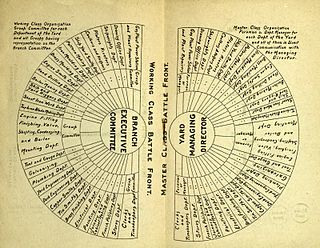A trade union, often simply referred to as a union, is an organization of workers intent on "maintaining or improving the conditions of their employment", such as attaining better wages and benefits, improving working conditions, improving safety standards, establishing complaint procedures, developing rules governing status of employees and protecting the integrity of their trade through the increased bargaining power wielded by solidarity among workers.
Collective bargaining is a process of negotiation between employers and a group of employees aimed at agreements to regulate working salaries, working conditions, benefits, and other aspects of workers' compensation and rights for workers. The interests of the employees are commonly presented by representatives of a trade union to which the employees belong. The collective agreements reached by these negotiations usually set out wage scales, working hours, training, health and safety, overtime, grievance mechanisms, and rights to participate in workplace or company affairs.

Industrial unionism is a trade union organizing method through which all workers in the same industry are organized into the same union, regardless of skill or trade, thus giving workers in one industry, or in all industries, more leverage in bargaining and in strike situations.
The Korean Confederation of Trade Unions (KCTU), literally translated as National Democratic Confederation of Trade Unions, also known as Minju-nochong is a national trade union centre in South Korea officially established in 1995. Its predecessor was the National Council of Trade Unions (NCTU), established in 1990 as an independent, democratically operated alternative to the Federation of Korean Trade Unions. Following the 2016–17 South Korean protests, the KCTU has seen accelerated growth in union enrollment, reaching 1,134,056 members in 2020 and making it the second largest industrial union confederation in Korea.

The Australian Council of Trade Unions (ACTU), originally the Australasian Council of Trade Unions, is the largest peak body representing workers in Australia. It is a national trade union centre of 46 affiliated unions and eight trades and labour councils. The ACTU is a member of the International Trade Union Confederation.

The Canadian Labour Congress, or CLC is a national trade union centre, the central labour body in Canada to which most Canadian labour unions are affiliated.

The European Trade Union Confederation (ETUC) is the major trade union organisation representing workers at the European level. In its role as a European social partner, the ETUC works both in a consulting role with the European Commission and negotiates agreements and work programmes with European employers. It coordinates the national and sectoral policies of its affiliates on social and economic matters, particularly in the framework of the EU institutional processes, including European economic governance and the EU Semester.

The Australian Workers' Union (AWU) is one of Australia's largest and oldest trade unions. It traces its origins to unions founded in the pastoral and mining industries in the 1880s and currently has approximately 80,000 members. It has exercised an outsized influence on the Australian trade union movement and on the Australian Labor Party throughout its history.

The National Trades Union Congress (NTUC), also known as the Singapore National Trades Union Congress (SNTUC) internationally, is the sole national trade union centre in Singapore. NTUC is at the heart of the Labour Movement which comprises 59 affiliated trade unions, 5 affiliated trade associations, 10 social enterprises, 6 related organisations as well as a growing ecosystem of U Associates and enterprise partners. Together, it helms May Day celebrations and organises an annual rally in support of workers' solidarity and commitment to tripartite partnership. The NTUC has had a symbiotic relationship with the People's Action Party (PAP) since its inception in 1961.

Union busting is a range of activities undertaken to disrupt or prevent the formation of trade unions or their attempts to grow their membership in a workplace.
The Zimbabwe Congress of Trade Unions is the primary trade union federation in Zimbabwe. The Secretary General of ZCTU is Japhet Moyo and the president is Peter Mutasa. The former General Secretary was Morgan Tsvangirai. Jeffrey Mutandare is a former president of the ZCTU.
Gibson Jama Sibanda was a Zimbabwean politician and trade unionist. He was a founding member of the Movement for Democratic Change and at the time of his death was the Vice-President of the faction of the Movement for Democratic Change led by Arthur Mutambara. A former president of the Zimbabwe Congress of Trade Unions, he was first elected to the House of Assembly in the 2000 parliamentary election. He was a member of the Senate and a Minister of State in the Office of Deputy Prime Minister Arthur Mutambara at the time of his death in 2010.
Labor federation competition in the United States is a history of the labor movement, considering U.S. labor organizations and federations that have been regional, national, or international in scope, and that have united organizations of disparate groups of workers. Union philosophy and ideology changed from one period to another, conflicting at times. Government actions have controlled, or legislated against particular industrial actions or labor entities, resulting in the diminishing of one labor federation entity or the advance of another.
Samuel Udo Basseylisten was a Nigerian trade unionist, he was a member of the radical but now defunct Nigerian Trade Union Congress. Along with, Michael Imoudu, Gogo Chu Nzeribe and Wahab Goodluck, they costituted the activist wing of trade unionism in Nigeria during the Nigerian First Republic. He was a former secretary of Nigeria Produce Marketing Company and the Amalgamated Associated Company.
The trade unions of Tanzania have a total membership of approximately 370,000. 350,000 of these belong to the Trade Union Congress of Tanzania, another 15,000 to the Zanzibar Trade Union Congress, and 2,400 are members of the Tanzania Fishing Crew and Allied Workers’ Union.
The Federal Ministry of Labour and Employment is the Nigerian Federal Ministry concerned with relations between workers and employers. It is headed by the Minister of Labour and Employment, who is appointed by the President, and is assisted by a Permanent Secretary, who is a career civil servant.
The Unión Obrera Democrática Filipina was a trade union center in the Philippines. The organization was the first modern trade union federation in the country; earlier labor groups had been more of mutual aid societies and guilds. The organization had thirty-three affiliated trade unions as of 1902. In 1903 the organization counted 150 affiliated unions, with around 20,000 members in the Manila area. At its peak, the Union Obrera Democratica had approximately 150,000 members in eight provinces of Luzon. Its members were also the very first members of the Philippine Independent Church when it was proclaimed in 1902.

The Irish Congress of Trade Unions, formed in 1959 by the merger of the Irish Trades Union Congress and the Congress of Irish Unions, is a national trade union centre, the umbrella organisation to which trade unions in both the Republic of Ireland and Northern Ireland affiliate.
The National Trades Union Congress (NTUC) spearheads the labour movement of Singapore, which represents almost a million workers in the country across more than 70 unions, affiliated associations and related organisations. Singapore runs on a tripartism model which aims to offers competitive advantages for the country by promoting economic competitiveness, harmonious government-labour-management relations and the overall progress of the nation.
The International Association of Sheet Metal, Air, Rail, and Transportation Workers (SMART) is a North American labor union headquartered in Washington, D. C., was chartered by the AFL–CIO in 2013. The product of a merger between the Sheet Metal Workers’ International Association (SMWIA) and the United Transportation Union (UTU), SMART represents over 210,000 sheet metal workers, service technicians, bus operators, engineers, conductors, sign workers, welders, and production employees, among others, throughout the United States, Puerto Rico, and Canada. The Transportation Division represents employees on Class I railroad, Amtrak, and regional and short line railroads; bus and mass transit employees on some 45 transit systems; and airline pilots, flight attendants, dispatchers and other airport personnel. The Division's 500 local unions organize conductors, brakemen, switch men, ground service personnel, locomotive engineers, hostlers, and railroad yard masters, as well as bus drivers and mechanics.








